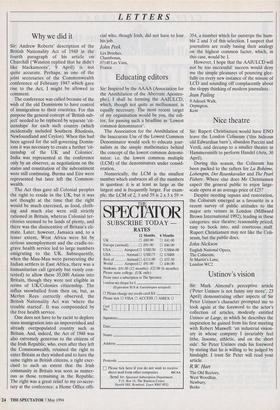LETTERS Why we did it
Sir: Andrew Roberts' description of the British Nationality Act of 1948 in the fourth paragraph of his article on Churchill (Winston replied that he didn't like blackamoors', 9 April) is not quite accurate. Perhaps, as one of the joint secretaries of the Commonwealth conference of February 1947 which gave rise to the Act, I might be allowed to comment.
The conference was called because of the wish of the old Dominions to have control of immigration to their countries. For this purpose the general concept of 'British sub- ject' needed to be replaced by separate 'cit- izenships' for each such country (which incidentally included Southern Rhodesia, Newfoundland and Ceylon). When this had been agreed for the self-governing Domin- ions it was necessary to create a further 'cit- izenship of the UK and Colonies'. India was represented at the conference only by an observer, as negotiations on the status and constitution of the subcontinent were still continuing. Burma and Eire were represented but later left the Common- wealth.
The Act thus gave all Colonial peoples the right to reside in the UK, but it was not thought at the time that the right would be much exercised, as food, cloth- ing and much else were still strictly rationed in Britain, whereas Colonial ter- ritories seemed to be lands of plenty, and there was the disincentive of Britain's cli- mate. Later, however, Jamaica and, to a lesser extent, West Africa were hit by serious unemployment and the cradle-to- grave health service led to large numbers emigrating to the UK. Subsequently, when the Mau-Mau were persecuting the Indian settlers in East Africa, there was a humanitarian call (greatly but vainly con- tested) to allow these 35,000 Asians into Britain, though they were not eligible in terms of UK/Colonies citizenship. The influx snowballed from then on, but, as Merlyn Rees correctly observed, the British Nationality Act was 'where the trouble started'. It was compounded by the free health service.
One does not have to be racist to deplore mass immigration into an impoverished and already overpopulated country such as Britain. And, indeed, the Act of 1948 was also extremely generous to the citizens of the Irish Republic, who, even after they left the Commonwealth, retained the right to enter Britain as they wished and to have the same rights as British citizens, a right exer- cised to such an extent that the Irish community in Britain was soon as numer- ous as those remaining in the Republic. The right was a great relief to my co-secre- tary at the conference: a Home Office offi- cial who, though Irish, did not have to lose his job.
John Peek
Les Broches, Chambonas, 07140 Les Vans, France


















































 Previous page
Previous page